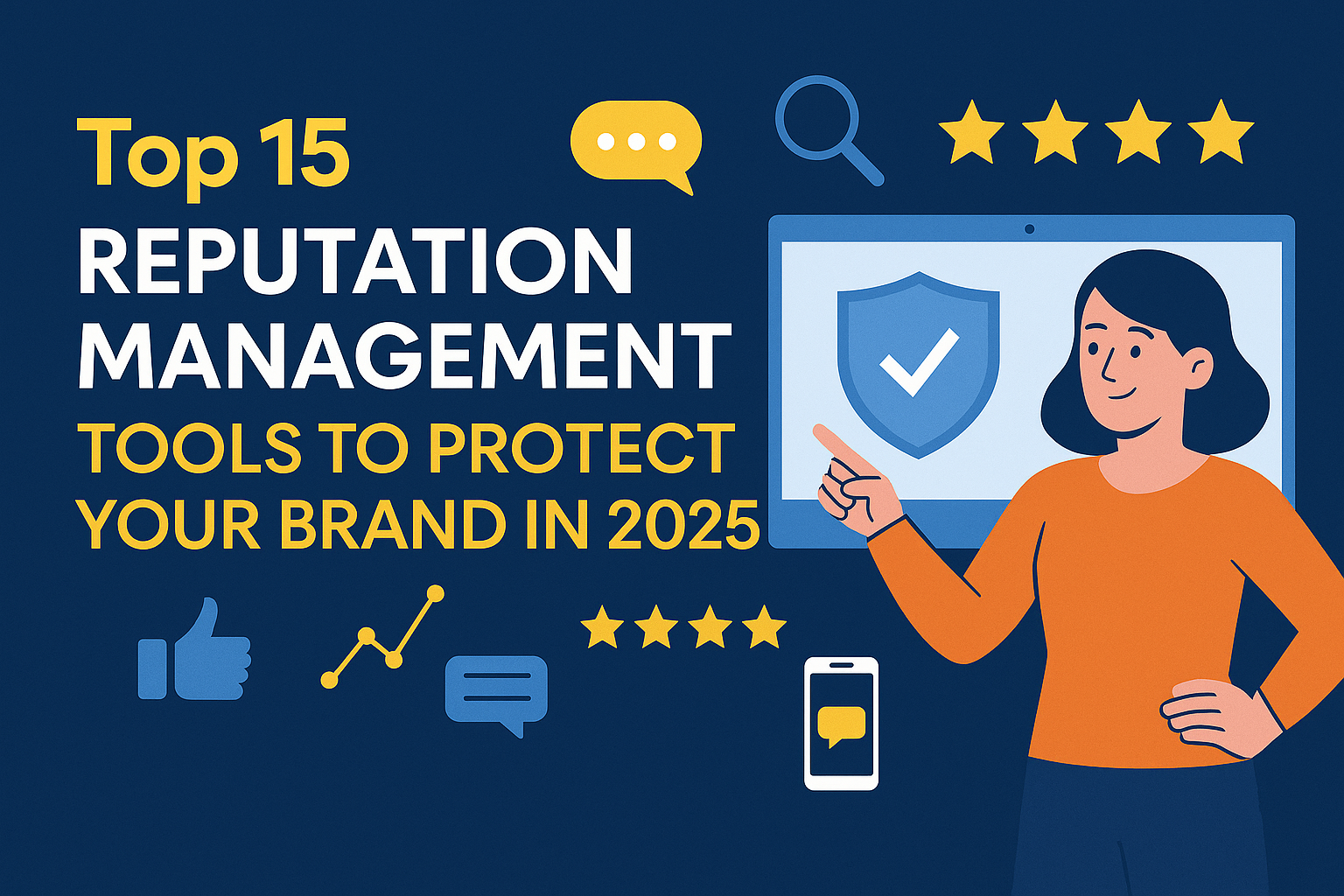Estimated reading time: 5 minutes
Building and protecting your brand’s reputation in 2025 is a multifaceted challenge. Online reviews, social media chatter, Google search results, and news coverage all shape how the public perceives you. That’s why using the right reputation management tools is more important than ever. These platforms empower you to monitor conversations, respond to reviews, analyze sentiment, and take proactive control over your brand image.
This guide breaks down the 15 best tools for reputation management, what makes them effective, how they help across different industries, and how to use them to build long-term brand trust.
Table Of Content
Why Use Reputation Management Tools in 2025?
- 94% of consumers say an online review has convinced them to avoid a business.
- Google’s first page captures over 90% of traffic—where your reputation is won or lost.
- With AI-generated content and fake reviews on the rise, brand monitoring is no longer optional.
Whether you’re managing a small business, personal brand, enterprise, or nonprofit, these tools offer essential visibility, insight, and control.
1. Google Alerts
Best For: Beginners, budget-friendly monitoring
Google Alerts is a free tool that emails you when your chosen keywords (like your name or company) appear online.
Features:
- Real-time web monitoring
- Easy to set up
- Custom frequency and sources
“Google Alerts helped me catch a local news story mentioning our brand before it trended.”—Small business owner testimonial
2. SEMrush Brand Monitoring
Best For: SEO-savvy brands needing in-depth insights
SEMrush’s brand monitoring tool lets you track mentions across blogs, forums, and news.
Features:
- Competitive analysis
- Link tracking and brand reach
- Sentiment scoring
3. Mention
Best For: Real-time social listening and media monitoring
Mention offers live tracking of social media, news, blogs, forums, and more.
Features:
- Multilingual support
- Engagement tools to respond from the dashboard
- Influencer tracking
4. Hootsuite
Best For: Social reputation management
Hootsuite combines social media scheduling, inbox management, and reputation insights in one dashboard.
Features:
- Unified inbox across networks
- Social listening integrations
- AI-powered response suggestions
5. Sprout Social
Best For: Brands focused on relationship-building
Sprout offers deep engagement metrics and client communication history, making it ideal for customer experience management.
Features:
- CRM-style engagement tracking
- Smart inbox with sentiment filters
- Employee advocacy tools
6. BuzzSumo
Best For: Content and PR reputation building
BuzzSumo helps monitor content performance and brand mentions across the web.
Features:
- Track mentions and backlinks
- Discover trending topics
- Analyze top-performing content
7. Awario
Best For: Keyword-based social and web tracking
Awario scans billions of web pages daily to track mentions of your brand.
Features:
- Boolean search for advanced queries
- Real-time alert system
- Market segmentation analytics
8. ReviewTrackers
Best For: Review management at scale
If your business is listed on multiple review sites, ReviewTrackers helps centralize and analyze that feedback.
Features:
- Integrates with Google, Yelp, Facebook, and more
- Review score tracking and trends
- Auto-request reviews via SMS/email
9. Brand24
Best For: Deep data visualization and sentiment monitoring
Brand24 helps you understand online conversations with detailed dashboards.
Features:
- Influencer score ranking
- Customizable data feeds
- Team collaboration tools
10. Reputation.com
Best For: Enterprise-level reputation management
Used by Fortune 500s, Reputation.com offers centralized visibility and enterprise-grade monitoring.
Features:
- Enterprise dashboard
- Review solicitation and moderation
- Custom AI sentiment analysis
11. Trustpilot
Best For: Verified customer feedback
Trustpilot’s verified review system increases credibility and helps manage your reputation on one of the most trusted review platforms.
Features:
- Verified customer invitations
- TrustBox widgets for websites
- Built-in SEO optimization
12. Talkwalker
Best For: Multinational brand tracking
Talkwalker is a top-tier analytics and listening platform for large brands with global reach.
Features:
- Real-time media analytics
- Crisis alerts and early warnings
- Global media database access
13. Yext
Best For: Local business listing reputation
Yext helps you manage your NAP (Name, Address, Phone) citations and review responses.
Features:
- Local SEO optimization
- Direct integrations with Google Business Profile
- Customer sentiment tracking
14. Social Mention
Best For: Simple, snapshot-style analysis
Social Mention aggregates user-generated content in one view, tracking brand strength and reach.
Features:
- Sentiment and reach scores
- Custom search queries
- Free browser-based tool
15. Defamation Defenders
Best For: Removing defamation and suppressing harmful search results
Unlike software tools, Defamation Defenders provides human-led solutions for:
Services:
- Legal takedown and court order support
- Suppression of negative search content
- SEO, content creation, and brand restoration
🛡️ Protect your brand with Defamation Defenders
Key Features to Look for in Reputation Tools
When choosing the right solution, consider:
- Real-time alerts for immediate response
- Sentiment analysis to gauge public opinion
- Scalability to support growth
- Cross-platform integration with CRM and support systems
- User permissions for team-based reputation management
Best Practices for Using Reputation Tools
- Monitor proactively—don’t wait for a PR crisis.
- Respond professionally—every review is public.
- Document feedback trends to inform strategy.
- Educate your team to maintain consistent brand tone.
- Update business listings regularly for local SEO impact.
Trends in Reputation Management for 2025
- AI-generated fake reviews are becoming more sophisticated.
- Google’s E-E-A-T signals (Experience, Expertise, Authoritativeness, Trust) continue to evolve.
- Video and podcast reviews are influencing brand sentiment.
- Search engines increasingly prioritize verified user content.
Frequently Asked Questions (FAQ)
Platforms that help you monitor, analyze, and respond to public sentiment about your brand across the web.
Many tools track mentions and link sources, which can influence off-page SEO and authority.
Social listening focuses on trends and audience insights. Reputation monitoring emphasizes brand mentions, reviews, and sentiment.
Yes, but it’s inefficient and not scalable for most brands.
If the content is defamatory, false, or violates terms of service, removal is possible. Otherwise, suppression and proactive engagement are best.
Defamation Defenders uses legal, SEO, and PR strategies—not just software—to resolve reputational damage and rebuild trust.
Related Contents:



